The Wolf Tooth Components CAMO or ‘Chainline And Material Optimization’ is a two-piece chainring and spider system for direct mount style cranksets for 1x 9, 10, 11 and 12-speed drivetrains. It’s currently compatible with the Race Face Cinch, Cannondale, e*thirteen and SRAM direct mount designs. The five armed CAMO Spider is a direct mount crankarm adapter and works with their CAMO chainrings, which come in elliptical, round, steel, and aluminum variations.
The benefits of the CAMO system (per Wolf Tooth):
- Perfect Chainline – for wear and shifting precision
- Optimal material usage – for weight, stiffness, and wear
- Price – for less expensive replacement chainrings
- Swapping – Very fast chainring change out with five small bolts and no nuts.
- Availablity – Wolf Tooth is the one-stop-shop for your direct mount needs. Round or oval, stainless or aluminum, and no matter the crankset.
- Bling!! – spider colors and bolt colors add a little flash to your sweet ride.
CAMO Spiders
The five-arm CAMO spider is made from 7075-T6 Aluminum and retails for $27.95, comes in black, red and blue colors and different chainline offsets. The spider comes with five black aluminum bolts, but for some flair, you can optionally order the bolts in black, blue, red, green, orange, purple, and silver for $5. As noted earlier, they’re compatible with Race Face Cinch, Cannondale, e*thirteen and SRAM direct mount cranksets.
The CAMO spiders come in different chainline offsets that are unique to the bike’s crank spindle width and rear hub spacing. They come in M9 (minus 9mm), M8 (minus 8mm), M5 (minus 5mm), M4 (minus 4mm), M2 (minus 2mm), M1 (minus 1mm) and P2 (plus 2mm). The number and letter refer to the mm offset and direction from the mounting face to the centerline of the teeth. The offsets will provide the proper chainline for regular, boost, plus and fat bike designs.
The spiders are threaded so that the chainring bolts will tap directly into them from the backside.
CAMO Chainrings
The required CAMO chainrings come in round and elliptical versions and either 416 Stainless Steel or 7075-T6 Aluminum options. The steel retails for $98.95 and comes in round versions with 28, 30 and 32-tooth sizes and elliptical versions with 30 and 32-tooth sizes. The aluminum retails for $44.95 -$49.95 and comes in round versions with 28, 30, 32, 34 and 36-tooth sizes and elliptical versions with 30, 32 and 34-tooth sizes.
The CAMO chainrings utilize theirs use their Drop-Stop wide/narrow tooth profile for the ultimate chain retention and mud shedding ability. The aluminum comes only in black while the steel comes raw silver. The elliptical versions use an ovality of 10% and timing of 112° after TDC (top dead center) for improved traction and acceleration. The steel model uses hardened and electropolished 416 stainless steel and will at least last 5-10 time longer than their aluminum chainrings.
Installation
The Race Face Cinch CAMO spider that I tested comes in M8, M5, and P2 options and for my Boost setup on my Ibis Mojo HD3, I choose the M5 version with the minus 5mm offset. The M5 dishes 5mm towards the frame for a functional 52mm chainline that is ideal for a 148mm Boost hub spacing on my Plus bike. For the chainring, I chose the CAMO aluminum 30-tooth elliptical version.
After pulling the Race Face Cinch cranks off my bike, I grabbed my Park BBT-22 bottom bracket tool and pulled off the existing chainring. I then grabbed the CAMO spider and lined up the small white line with the crankarm body and using the BBT-22 tool I snugged down the lock ring to spec.
I then lined up the white dot on the CAMO elliptical chainring with the white dot on the CAMO spider and threaded in the chainring bolts from the backside and tightened them to 3Nm of torque. Finally, I reattached the crank arms to the bike, and it was ready to go.
Impressions
After using and installing the CAMO system, I have become quite enamored with its simplicity and ingenuity. It’s easy to install and when it comes to change or swap out the chainring, just remove the five bolts, line up the new chainring, and reinstall the bolts. The system is advantageous since you don’t need to remove the crankarm to change the chainring, just unbolt the ring, and it can be finagled off for a new install. Although you’re stuck with their non-standard BCD that the CAMO spider uses, the CAMO chainrings are cheaper than direct mount chainrings from Wolf Tooth, third party vendors and major manufacturers such as SRAM. Since the crank specific spider handles the direct mount interface and chainring offset, the rings can be standardized, so no matter what the offset and crank design, any of their CAMO chainrings will work: elliptical, round, steel, aluminum of any tooth size. The CAMO system is functional for Wolf Tooth inventory since they don’t have to carry oval and round chainrings in multiple sizes and materials for different vendors direct mount systems.
Because the spider attaches or plugs directly into the crankarm, they can use small, lightweight bolts since they aren’t carrying a heavy shear load. The CAMO system ends up being around 10 grams lighter than a comparable individual aluminum direct mount chainring, and when using steel chainrings, they’ll be an even greater weight savings.
Elliptical chainring
The Oval or Elliptical chainrings shape provides an efficiency benefit and smoother power output throughout their pedaling stroke, and they offer improved traction and faster acceleration and reduced stress on the knees. During pedaling, the radius of the oval chainring is constantly changing to help match your power output and natural leg kinesiology. They maximize the portion of the stroke where power is produced and minimize resistance where it isn’t, providing an even cadence and smoother torque to the rear wheel thereby reducing spinouts and stalls on tough climbs, especially on loose terrain. Every company that makes oval chainrings has their particular shape and ovality design and Wolf Tooth utilizes an ovality of 10% and timing of 112° after TDC (top dead center).
Initially, the oval chainring didn’t feel much different than normal, other than an odd change in the rhythm of my spinning, call it a pulsing feeling. I did start to notice that I was riding faster and in lower gears on the flats and easier undulating terrain. It felt as though it was easier to hammer and I was riding at a somewhat faster clip. When it came time to stand up and crank hard on the pedals it seemed to require less effort, and I found myself doing so more often. After some time on the oval chainrings, I came to the conclusion they preferred a lower gearing and cadence, so I found myself shifting more often to stay in the sweet spot.
On long climbs, the oval chainring performed admirably, and I felt as though they shined on steep slow grinder climbs, offering excellent traction and smoother spinning. On technical maneuvers and spots that required you to make sudden bursts of speed, the Wolf Tooth oval chainrings worked like a charm, and I was able to crank up through stair steps and rocky sections with formidable ease. I have had issues with other manufacturers oval rings on techy terrain, in which they would occasionally give me problems and cause stall outs and create situations where I couldn’t fully extract the power of the drivetrain. Things were exacerbated by catching the power spot of the oval chainring at the wrong location at the wrong time. I rarely had that issue with the Wolf Tooth oval rings, which I attribute to their ovality and timing.
Bottom Line
The CAMO system comes with the superb Wolf Tooth quality and workmanship and provides the proper chainline for 1x drivetrain functionality, is lighter and costs less than a comparable direct mount chainring, and it’s easier to swap out chainrings when replacement time comes around.
CAMO System
The Wolf Tooth CAMO two-piece system consists of the five-arm CAMO Spider which is a direct mount crankarm adapter and the CAMO Chainrings which are unique to the spider. The spider comes in Race Face Cinch, Cannondale, e*thirteen and SRAM direct mount cranksets versions and is made from aluminum and retails for $27.95. The chainrings come in oval, round, steel, aluminum versions in varying tooth sizes with the steel retailing for $98.95 and the aluminum for $44.95 -$49.95. The innovative CAMO system makes it easy to install and remove chainrings, and the design allows swap outs without having to remove the crankarms.
Since the spider comes in various offset versions, you can choose the proper chainline for your crank spindle width and rear hub spacing. This design means the chainrings can be standardized and any chainring, whether elliptical, round, steel, aluminum, and in any tooth size will fit on any spider, regardless of the offset. Also, the design optimizes the weight per the material used and when it’s time to change chainrings they’re cheaper.
Elliptical Chainring
When comparing the elliptical chainring against the standard round version, I found that I was faster in some terrain and a tad slower in others, so it’s tough to nail down my overall tempo on an entire ride. It smooths out the pedal stroke overall, and my legs worked more efficiently throughout the whole cycle. There aren’t any useless dead spots, and it utilized my legs natural strength curve. There wasn’t an increase in the power I could generate, only how I was generating the power through the stroke cycle. Oval rings offered improved traction and decreased rear wheel spins.
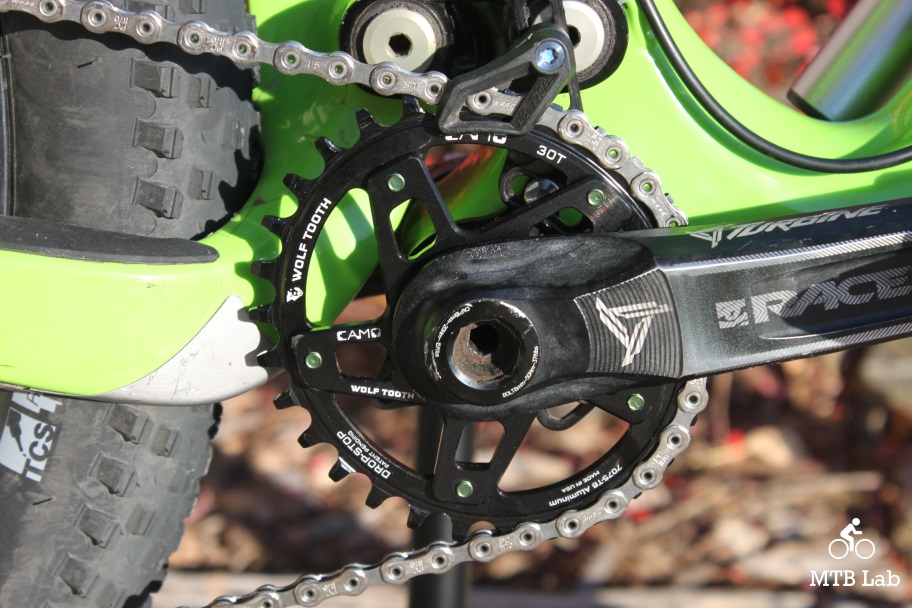
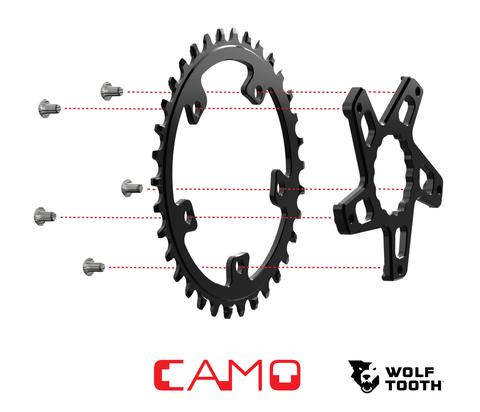
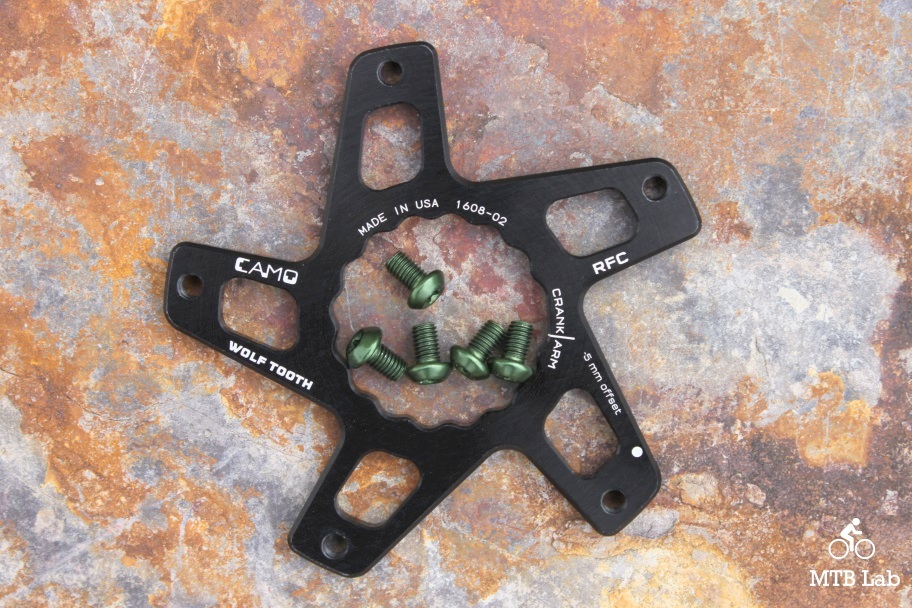
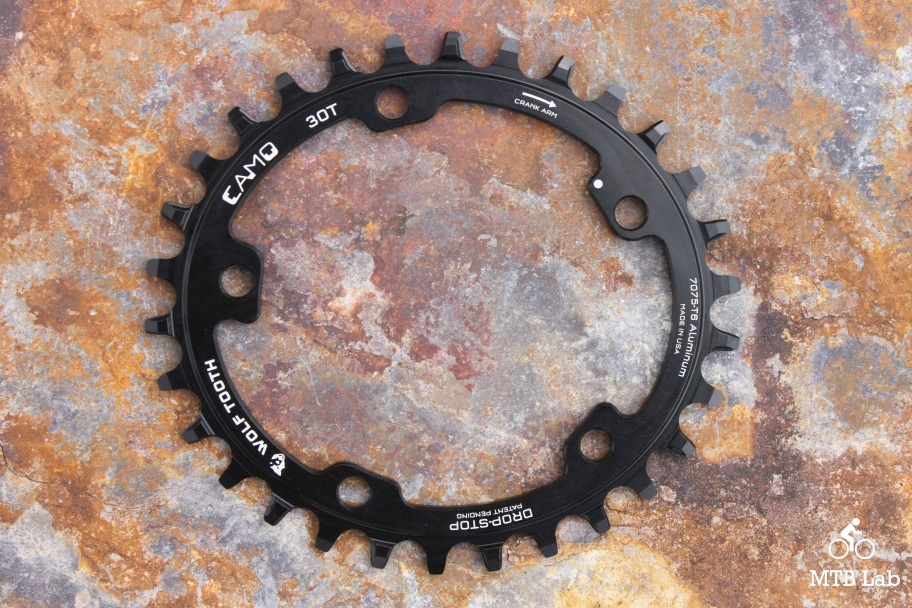
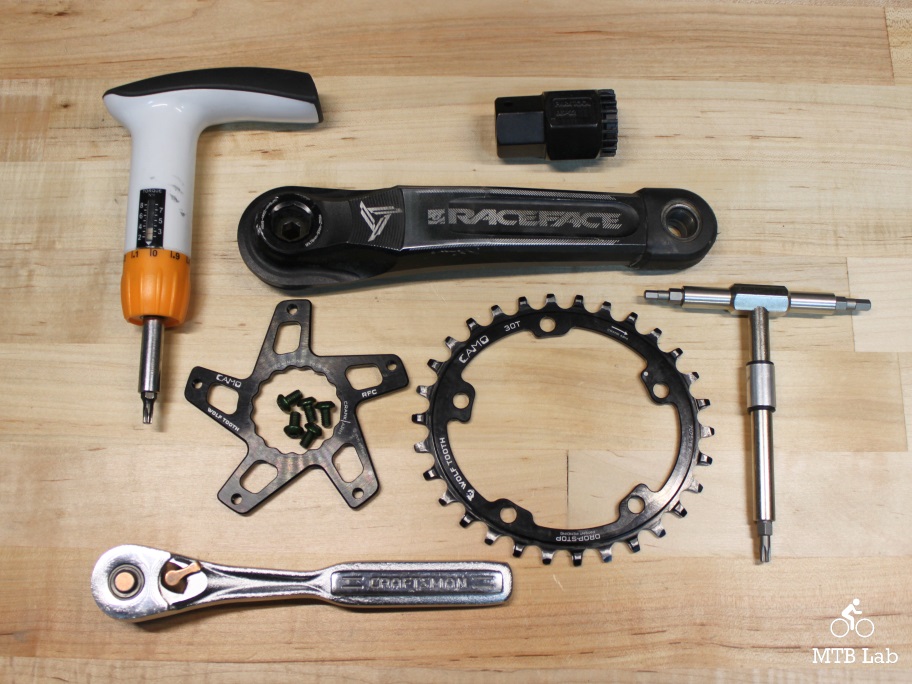
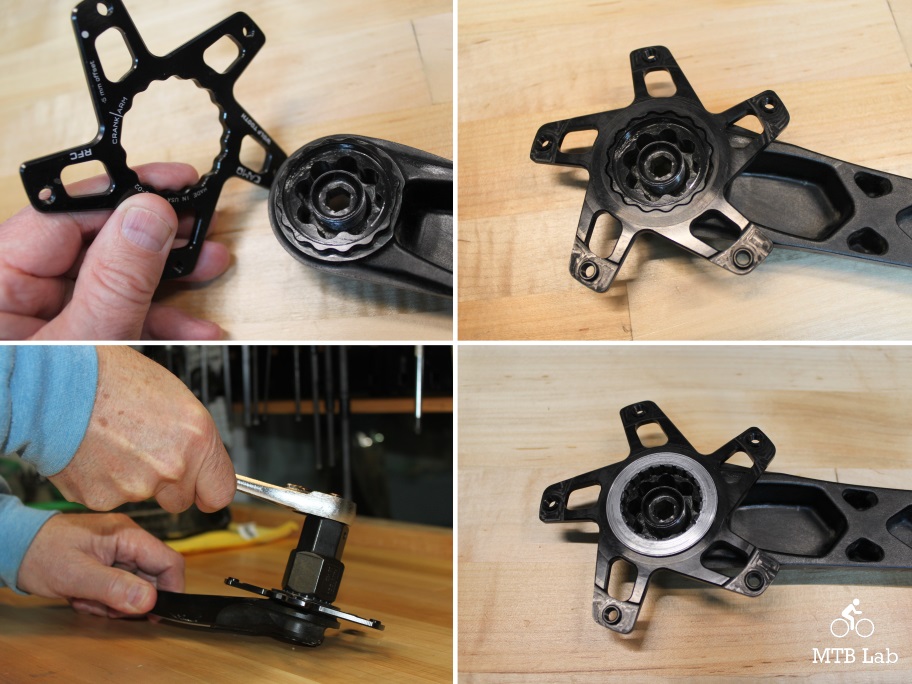
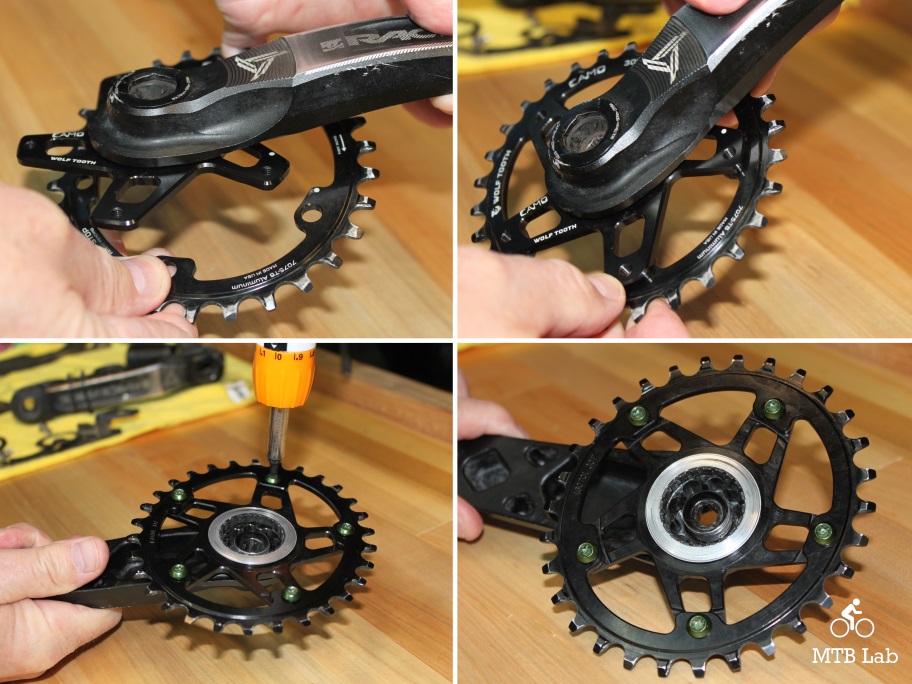
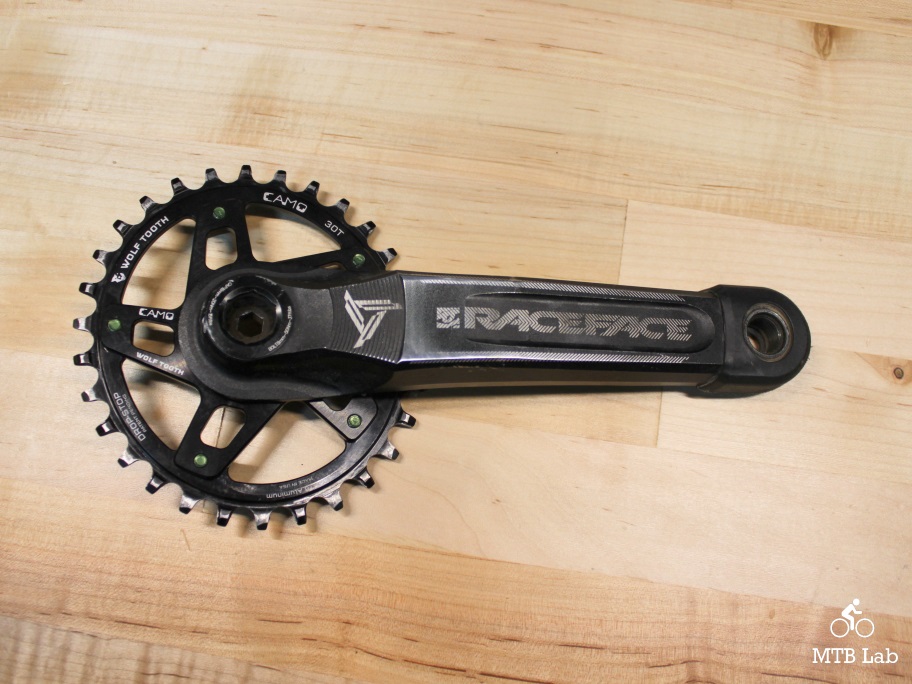
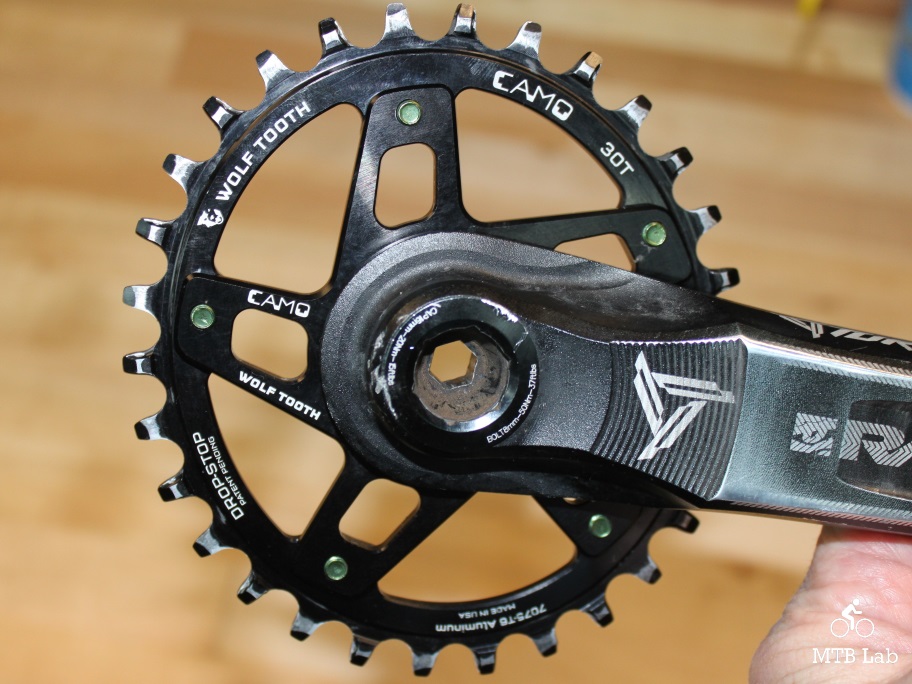





{ 0 comments… add one now }